Post-traumatic stress disorder: Study into increased risk of physical problems will assist veterans
A GIRL lies bleeding. Major Andy Cullen can smell the dirt, the blast. Except he’s not in Afghanistan anymore, he’s acting out a nightmare – his daughter in his arms, his wife pleading “put her down”.
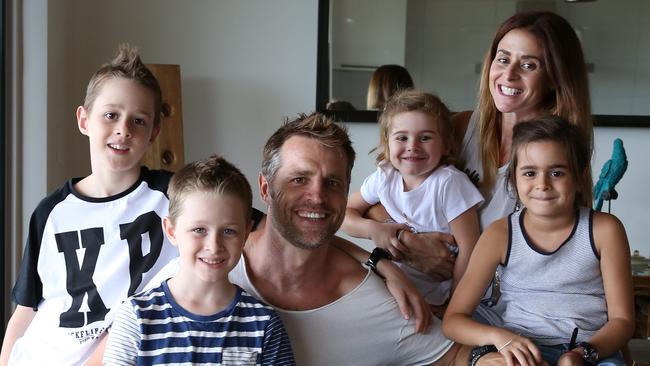
QLD News
Don't miss out on the headlines from QLD News. Followed categories will be added to My News.
A LITTLE girl lies motionless by the roadside, blood oozing from a blast injury, her clothes in tatters. Part of her arm is missing. Australian Army troop commander Major Andy Cullen can smell the blood, the explosives and the dirt. He kneels beside the child and starts bandaging her arm to stem the blood flow. It’s the type of scene he’s dealt with dozens, perhaps hundreds of times during tours of duty in Afghanistan.
But this is not the war-torn Central Asian country. He’s inside his own home in Queensland’s peaceful Gold Coast hinterland, more than 11,000km away, where he lives with his wife, Zoe, and their four children – Joseph, 11, Charlie, 9, Eden, 6, and Ireland, 3. Years have passed since he left the army. Andy is acting out a nightmare. He can hear Zoe’s voice in the darkness asking, “What are you doing?” and telling him to “put her down”.
“She’s going to be OK,” he replies. “I’m looking after her.”
It’s several minutes before Andy snaps fully awake, looks down and sees his youngest daughter, Ireland – free of blood, bandages and blast injuries – and not the Afghan girl, whose face is imprinted in his mind. These days, he understands that acting out his dreams is a recognised symptom of post-traumatic stress disorder (PTSD). But for years, entrenched in the army culture, he reluctantly admits he dismissed mental illness as a weakness.
“I had negative preconceptions of anyone who had signs of mental illness,” he says. “When I started suffering, I saw it as a weakness in myself. I was very embarrassed. I didn’t want to talk to anyone about it and I certainly didn’t want to admit my issues to colleagues or Defence because I thought if I did, my career would be over. I thought I was going crazy.”
There have been times Zoe has woken suddenly in the middle of the night to find Andy pinning her to the bed and pleading with her not to move in case she “sets off a device”. Or she’ll wake up with him patting down her body and telling her: “I’m putting the fire out”.
“He acts everything out,” Zoe explains. “He sees stuff. It’s so real that we’ll be having a conversation about what he’s seeing, what he’s doing. That to me shows how amazing the mind is. Sometimes I have to punch him in the shoulder to snap him out of it.”
Andy still acts out night patrols in his sleep, though not as frequently as in the past. “I tend to snap out of it a bit quicker these days and my transition back to reality is a bit smoother.” One night after hearing a noise, he went outside to investigate. “I hid behind my car and I saw this guy unloading what I saw as weapons from the back of a truck,” he says. “I wasn’t really awake. I went up behind the guy and I had him in a chokehold until I realised: He’s just carrying milk. I didn’t know what to say. I was so shocked.”
Outwardly, Andy appears fit and healthy. But he’s carrying a combat injury as real as his colleagues who returned from war zones with missing limbs. The key difference is the injury Andy incurred serving his country is invisible. Day after day, month after month of experiencing trauma in Afghanistan doused his brain with so many stress hormones, he describes his PTSD as an acquired brain injury.
Australian Defence Force members, police, paramedics and other first responders are known to be particularly vulnerable to PTSD, given their increased risk of having to deal with repeated trauma.
“I think you’ve got a cup and when it’s full, it’s full,” Andy says. “You can’t just keep pouring stuff into it. My cup was full. I was done.”
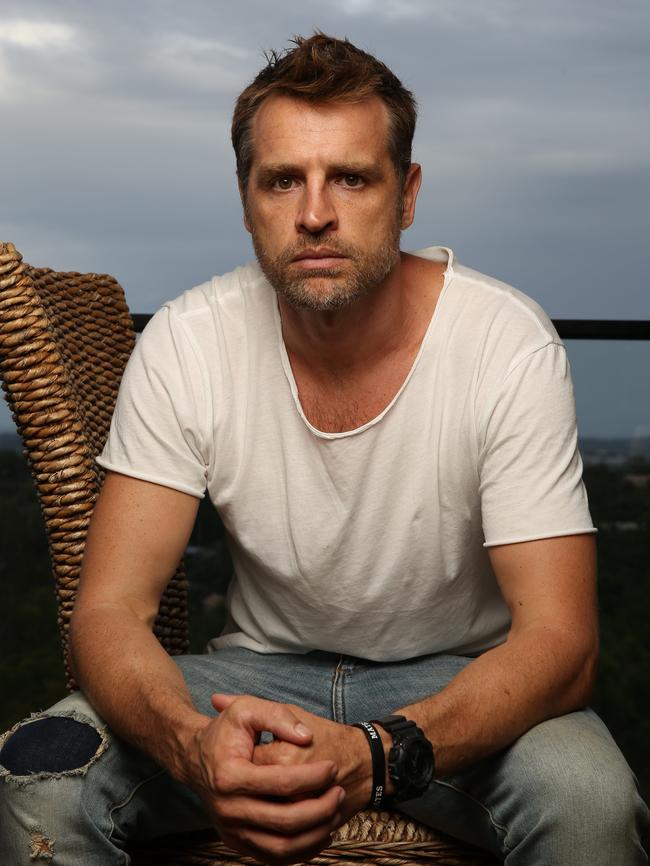
Brisbane psychiatrist Professor Bruce Lawford, who has been treating veterans for three decades, says studies show up to one in five of them will experience PTSD. “It’s huge,” Lawford says. He describes the condition as complex and says much about the illness remains poorly understood.
A study published in the Medical Journal of Australia this week, which compared about 300 Vietnam veterans – some with PTSD and others without – found the illness is as much physical as it is psychiatric. Although all the veterans had experienced trauma while in Vietnam, those with PTSD were much more likely to have had heart attacks, stomach ulcers, irritable bowel syndrome and sleep disorders, even after the researchers adjusted for lifestyle factors such as smoking, obesity and lifetime alcohol use.
The findings of the Brisbane-based Gallipoli Medical Research Institute study come as no surprise to the Cullens. “Your mind is so in tune with your body, you can’t separate them,” says Andy, now 39. “Stress manifests itself in really strange ways. My body was having all these strange physical reactions. I’ve had heart palpitations. I’ve had a pressure build-up in my head that was so intense I thought I was going to have an embolism and die or something. I’d get rashes all over my body.”
Lawford says the institute, based at the Greenslopes Private Hospital in Brisbane’s south, in conjunction with overseas collaborators, is analysing the DNA of Australian Vietnam veterans in a bid to better understand the causes of PTSD. He says the belief is that repeated stress can result in chemical changes to veterans’ DNA that affects how their genes function. “It may be contributing to them developing symptoms of PTSD,” Lawford says. Some people might also be born with certain genes, which, combined with repeated exposure to trauma, make them more susceptible to the disorder.
More research is needed to find better treatments, but Lawford says available therapies are extremely helpful. “The treatments we have can improve people markedly but it doesn’t cure them,” he says. “A lot of people still have a fair few symptoms after years of treatment. We need to keep working on it. We need to find more advances. That’s true with everything in psychiatry, really. Some people respond to certain pills and other people don’t.”
Andy is a veteran of two tours of Afghanistan – six months in 2008 and 11 months in 2011-12 during a distinguished 17-year career with the ADF. Before leaving the army in 2012, his job was one of the most dangerous on the planet – bomb disposal. In Afghanistan, improvised explosive devices (IEDs), commonly used as roadside bombs, were one of the enemy’s weapons of choice. Andy commanded the Australian bomb disposal teams responsible for defusing IEDs. He and his team were also called on after roadside explosions to make sure the area was safe.
“A lot of these post-blast scenarios were really quite severe so we had a lot of civilian casualties, a lot of children,” he says. “That’s what really stuck in my mind after I left Afghanistan – the kids.”
His own life was also frequently at risk on overseas deployments. Andy survived so many close encounters with rockets in Afghanistan, he was nicknamed Rocket Man. “We got rocketed a lot,” he says. He was once knocked unconscious after a rocket hit sandbags protecting his bunker, a buried shipping container in which he slept, inside the Australian compound. “It exploded about a metre and a half above my head,” Andy says. “I woke up and the room was full of smoke.” The door had to be jemmied open to free him.
But Rocket Man’s nightmares only began when he returned home. “To be completely honest, I didn’t have any problems when I was overseas,” Andy says. “I was normal there. My brain would work fine. I felt like I was in complete mental control of what I was doing. I totally separated what was occurring and threw it to the back of my mind and cracked on and did the job. I didn’t allow myself to process anything, to dwell on anything. There were some shocking incidents where I’d go, ‘whoa’. But I’d have to just tell myself: Don’t worry about it. Don’t focus on it and move on. And that’s what I told my men. I saw some of my soldiers had some big issues during events, not being able to function properly. There were a lot of dead people around, or their friend or colleague had been blown up. I’d say: ‘Hey, snap out of it. We’ve got a job to do. Let’s go’. That’s appropriate at the time. But what I failed to do as a commander when we were safe, when we were back in a patrol base and things were fine, was to say: ‘Let’s sit down and review the incident’. I never gave them the opportunity to decompress, to talk about it. There wasn’t a lot of training in dealing with people who had issues.”
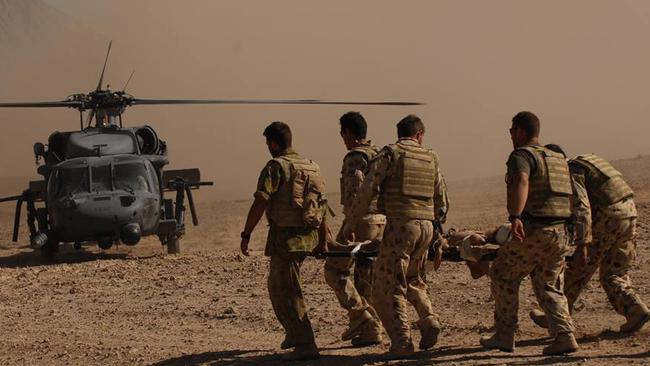
Things in Andy’s life began to unravel as he tried to transition back into society, and into family life, after his tours of duty. He had trouble sleeping and turned to alcohol when the traumatic memories started to replay in his mind. “I was having full-on mood swings, uncontrollable anger,” Andy says. He would have difficulty concentrating and, with his short-term memory issues, forgetting conversations. “I couldn’t even read,” he says. “I’d read the same sentence or paragraph over and over again. I was so infuriated with myself. I’m an educated guy, I like to think I analyse things and if something’s wrong, I want to know what the cause is and how to fix it.” His relationship with Zoe and his children began to deteriorate. “It got to a point with the kids, and this really breaks my heart, that I lost all empathy and ability to care,” Andy says.
Before Andy’s PTSD diagnosis, and having little knowledge of the illness, Zoe struggled to comprehend the changes in the compassionate, loving man she had met in December 2001 at Cocomangas, a nightclub in her home town of Byron Bay, northern NSW. “It was like somebody had flicked a switch,” the 39-year-old says. “If you’re not aware it’s PTSD, you just think he’s become a real ratbag. He’s not the man I married. He no longer has any compassion towards my children. He’d go into these deep, dark bouts of depression and withdraw into himself, and I’d be like: ‘I don’t understand it. We’ve got kids. Snap out of it’.”
The third-generation military man reluctantly left the army five years ago to save his marriage and reconnect with his children. At that stage, he was yet to be diagnosed with PTSD. “I felt massive guilt leaving,” he says. “I was very patriotic. I had a concept that to serve the military was to serve something greater than yourself. But I was burnt out, I was done.” Although Andy had asked for a “respite position” when he returned from Afghanistan in 2012, the army denied his request. “That’s the only reason he left,” Zoe says. “They said: ‘Sorry, we need you’. They were just like: ‘There’s a need to be met and you’re going to go and fill it’. They failed us there.”
Andy took a high-paying job with a private company training police and military officers throughout the world in counter-terrorism and bomb disposal. He lasted eight months before having to resign after a “massive mental breakdown”, which resulted in him being diagnosed with PTSD. It was the beginning of a long journey to find doctors, therapists, medication and lifestyle strategies to treat his condition. “You’ve got to allow other people in,” he says. “There’s no way I’d have been able to continue in life trying to fight this on my own. I sought help. I started seeing a psychiatrist, I started medications. My position on drugs is: there’s a need and there’s a time and a place. For me, they saved my life. If I didn’t have them, I wouldn’t be here.”
But he says the starting point towards healing was talking about his illness – to Zoe, to his psychologist, Dr Greg Gardiner, and to trusted people in his life. “Otherwise you’re just carrying the burden by yourself,” Andy says. “I had a perception that if I told anyone this, it would be a negative thing. But the reality is very different. Everyone wants you to succeed. No one wants you to suffer.”
Gardiner worked with him on creating a positive mantra to start each day: “Today’s a good day and I’m enjoying my life”.
“I struggled for weeks to even verbalise it,” Andy admits. “It was a lie. It wasn’t true. I was fighting against the negative voices in my head, everything that was telling me, ‘You’re not good enough. You’re a failure’. It took me a while, but I started saying the mantra every day and eventually I started to believe it. There were moments when I thought: hang on, I’m actually smiling, I’m actually happy. And there were glimmers of hope when I went: ‘I’ve got to keep doing this. This is working’. I have great moments of happiness with my family, with my friends, with Zoe that I never thought I’d get again. Life does get better. I still have some really bad days, but the good days outweigh the bad.”
He also found faith, joining the Elevation Church, at Varsity Lakes on the Gold Coast, in 2013. “Zoe’s been Christian her whole life,” Andy says. “I haven’t been. I was raised Catholic. It was more of a nominal thing. Through this journey, I said a number of prayers at some pretty key times in my life when I was right on the edge of suicide. I asked God to help me. He turned up in a real way in my life. It’s been the thing that has given me the strength to move on, understanding that I can’t carry this alone. I’ve been able to give that to God and say: ‘It’s too hard, I can’t do it. Help me’. I’ve learnt through prayer and meditation I’m able to quieten myself.”
An Australian Institute of Health and Welfare study into suicides among serving and ex-serving ADF personnel between 2001 and 2014 identified 292 certified cases of people taking their own lives – 84 in the full-time serving population, 66 in the reserves, and 142 in ex-serving men and women. The study did not include people who had left Defence before 2001, and nor did it account for an unknown number of deaths suspected to be suicide.
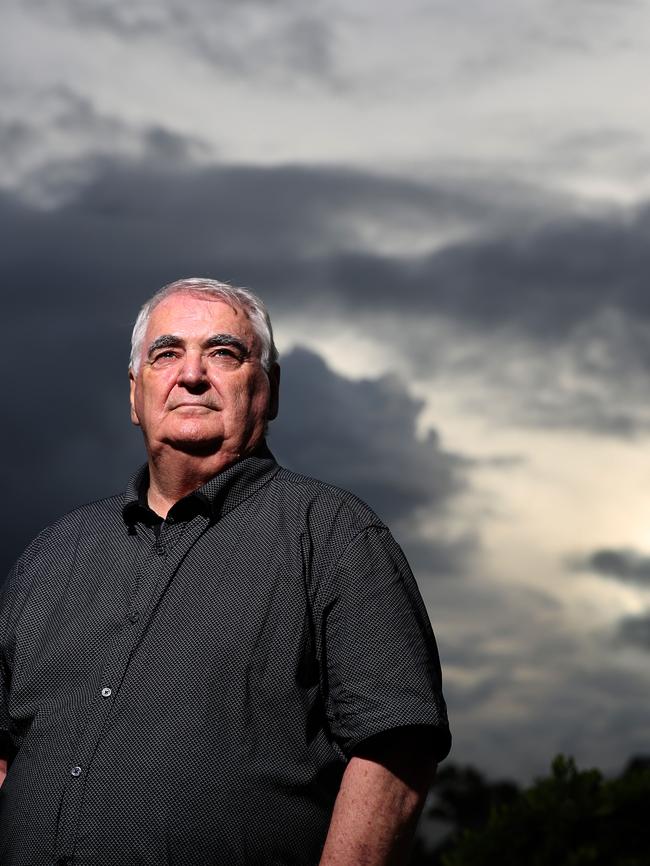
Vietnam veteran Richard McLaren was diagnosed with PTSD in 1994, 24 years after his war service. At that stage, he’d been through three marriages and another long-term relationship. Family break-ups are not uncommon in people with PTSD. Richard no longer sees his five children. He has grandchildren and great-grandchildren he’s never met. “I went through a period where I got so sick and tired of people saying to me, ‘You look all right, there’s nothing wrong with you’, which included my family. I wanted to put a bandage around my head with one of those fake arrows and walk around with that so that people could see that there’s something wrong.”
The 70-year-old started dating his current wife, Karen, 52, around the time he was told he had post-traumatic stress, a condition he prefers not to describe as a disorder. “It’s a brain injury, not a disorder,” Richard says. “Calling it a disorder stigmatises it.” Every Friday, Karen acknowledges another week of married life on the calendar. So far, they’ve reached 1140. They celebrate each week as an achievement after the “massive hell” they have experienced with Richard living through PTS. “We do it weekly because when Richard was in the depths of PTS, it was a pretty black, horrible, awful place,” Karen says. “Just making one more week was pretty good. It was a way of helping us get through it back then and it helps us remember how lucky we are now.”
Richard went to a particularly dark place after a heart attack in 2004, which ended his working life. He was at home alone one day when he came close to suicide. “I went outside, I was sitting on a bench,” he recalls. As he prepared to end his life, a rescue dog the McLarens had taken into their home, a Tibetan spaniel with one eye named Zou-Chai, ran to him and put his paw, then his head, on his owner’s knee. Looking up at Richard with his one eye was enough to stop the suicide attempt. “He was Richard’s constant companion,” Karen says. “He knew. He was one of those dogs who sensed things. When Richard was really bad, he’d come and sit beside his chair at a height so that Richard could just put his hand down and pat him.”
Richard served in Vietnam between December 16, 1969, and August 21, 1970, as a member of the RAAF’s 9th Squadron, based in Vung Tau. He worked as a helicopter crewman and almost half a century later still has visions of the first body of an Australian soldier he hoisted into the helicopter. “He was wrapped up in his groundsheets. His boots were sticking out at the end,” Richard recalls. “I remember just sitting there looking at this guy’s boots and thinking: There’s a family back in Australia that has no idea we’re transporting him. They’ll get the news sometime in the future that he’s been killed. That brought home a lot to me’.”
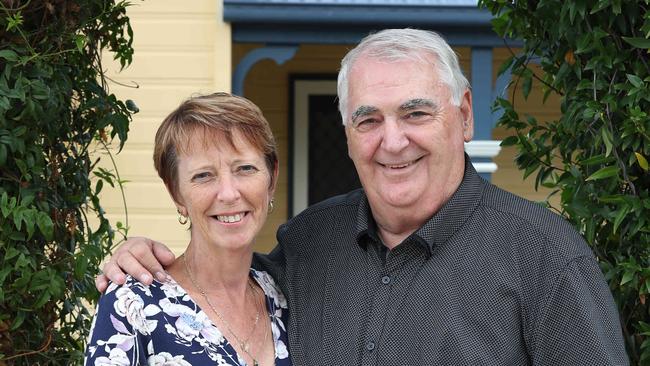
But as with Andy Cullen, it’s the memory of children that often affect him more than others. He remembers the helicopter he was flying on being surrounded by children as the airmen waited for their commanding officer one day in the Vietnamese town of Baria, between Vung Tau and Nui Dat. “We would have our guns ready to fire, what they call ‘hot’, while we were on the ground,” Richard says. When they were preparing to fly out, just as they were lifting off, a handful of stones hit the visor of Richard’s helmet. “I thought we were being attacked,” he says. “I swung the M60 around and I was looking straight down the barrel at a five-year-old kid,” he says. “My hands were on the trigger. I can still see his eyes, I can still see the clothes he’s wearing, everything.” The gun was aimed at the little boy’s head. Karen constantly reminds her husband he didn’t pull the trigger that day. “Yeah, but I could have,” Richard replies.
The disturbing visions are as vivid as they were in 1970. But images are also giving Richard some respite from his post-traumatic stress. At one of the lowest points in his life after his heart attack, the once-keen photographer was encouraged to pick up a camera again, rekindling his love of photos, and giving him a new purpose. “I had no self-worth,” he says. “I couldn’t do anything, I couldn’t set any goals, I couldn’t earn any money. That’s when the camera came in. It gave me something to do.” More than a decade later, he’s teaching photography to other people with PTS as a therapy. He admits he still has days when he doesn’t want to leave the house. “You have your weeks when you just can’t be bothered to shave or put clean clothes on or anything,” Karen adds. But he’s improved to the point where she no longer fears leaving him when she goes to work each day.
Richard is one of hundreds of Vietnam vets who are part of the ongoing PTSD research at the Gallipoli Medical Research Institute. Institute director Professor Darrell Crawford, a liver specialist, says the study into the increased risk of physical problems associated with the condition, such as heart disease and gastrointestinal problems, will assist general practitioners and medical specialists in diagnosing PTSD earlier and allow them to suggest more personalised lifestyle interventions that may reduce the health impacts. “You’ve got a whole series of veterans who are now 50 years from the campaign who still have physical manifestations of PTSD,” Crawford says. “It’s amazing that it continues through their lives for this long.”
Crawford, 58, has his own family connection with PTSD – his uncle, Darrell Davey, was a World War II veteran who experienced symptoms but was never formally diagnosed. The American Psychiatric Association’s Diagnostic and Statistical Manual of Mental Disorders did not include PTSD until 1980. “My mum used to describe, for years after he came home, the incredible nightmares and sleep disturbances that he used to have,” Crawford says.
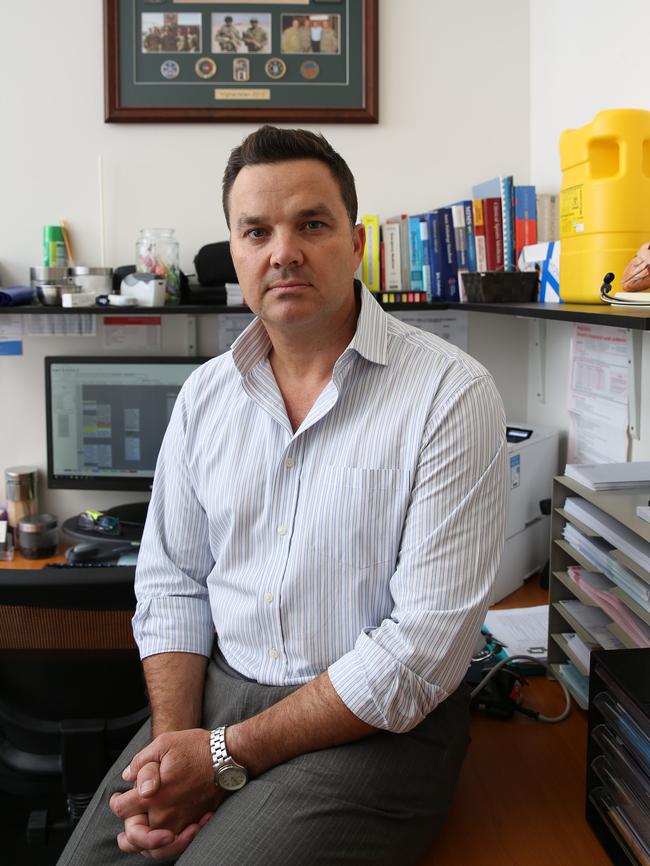
Brisbane GP Dr Phil Parker, who served as a senior military medical officer in Uruzgan Province for six months in 2012, says although it’s almost 40 years since PTSD was officially recognised by psychiatrists, the ADF failed to adequately prepare soldiers for the trauma they would potentially face in Afghanistan. “I looked at what we did to our medical staff and I feel a little bit ashamed,” Parker says. “Our medics are not doctors and they’re not nurses, and they had never been exposed to trauma environments. Some medics were in isolated patrol bases and had to deal with gunshot wounds, explosion wounds, vehicle accidents. There was no way they were adequately prepared for what they had to deal with on their own with minimal support.”
Parker says he has patients with PTSD who have served in theatres of war dating back to World War II. “I’ve got a few WWII veterans who suffer PTSD symptoms. I’m surprised by how poor their sleep is,” he says. “They just accept these symptoms as part of their everyday life. They say, ‘It’s just the way it is’. They don’t want attention brought to it.”
The 46-year-old says that while PTSD is more accepted among younger veterans, he believes many of those who remain in the military fail to reveal their condition for fear it will affect their service. “I do know that a lot of people chase deployments and they choose not to reveal PTSD symptoms,” Parker says. His hope is that the latest research will assist GPs in better recognising PTSD in their patients, particularly those who have served in the armed forces. “There are a lot of people out there who either haven’t been picked up or haven’t presented to their GP who are suffering, their family and personal lives are suffering, and they’re struggling with employment,” Parker says.
Andy and Zoe Cullen have become ambassadors for veterans’ charity Mates4Mates, hoping that telling their story will help other couples dealing with PTSD. Mates4Mates offers a holistic approach to addressing PTSD, including yoga and massage classes, as well as exercise programs and psychological support, through their Family Recovery Centres.
“If we’d found Mates4Mates five years ago, the suffering probably would not have been so great,” Zoe says. “We were lucky we had a church family to help us with that.
“We’ve defined our purpose in our suffering,” she adds. “We can use it for something good and that’s given us a lot of drive. For all we’ve been through, I wouldn’t take any of it back because we’re stronger now. We’re better than we ever were together. We know why we’ve gone through all this.” It’s to give hope to other families struggling with PTSD.
If you or someone you know needs help, contact Lifeline on 131114, BeyondBlue
Andy and Zoe Cullen have self-published a book, Resurrected: a Story of Hope, which will be launched at Hillcrest Christian College on the Gold Coast on April 27 at 7pm.


